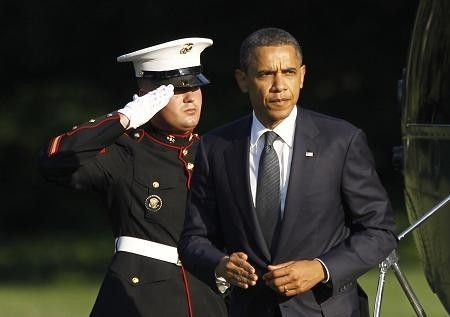Obama Approval Rating at 46%, but Independent Support Remains Low
Analysis

In a single year, Hall of Fame Boston Red Sox left fielder Carl Yastrzemski -- the last player to win baseball's triple crown (1967) -- was hitting .300 every way you could slice it.
The year was 1970 and Yaz was hitting .300 at home and on the road, in day games and night games, against right-hand starting pitchers and left-hand ones. In short, Yaz was a .300 hitter in every way. He finished the year at .329.
Not so with President Barack Obama, concerning his latest public approval rating, according to the Gallup poll. Obama's approval rating of 46 percent during the poll, taken Jan. 2-4, represents the continuation of a gradual uptrend -- it's up from 38 percent in October 2011, but his batting average, unlike Yaz's, is by no means universal.
Men gave Obama just a 41 percent approval rating; women, 50 percent.
Obama's approval rating also varies by voter age. Young Americans, ages 18-29, gave Obama a 51 percent approval rating; middle-aged Americans, ages 30-49, 44 percent; older Americans, ages 50-64, 46 percent; and senior citizens, ages 65 and up, 43 percent.
Biggest Approval Difference? Democrats vs. Republicans
The biggest approval rating category differential? You guessed it: political party affiliation, called party identification by political scientists and historians.
Among Democrats, 83 percent approved of Obama's performance; Independents, 41 percent. However, just 10 percent of Republicans approved of Obama's performance.
A similar -- though not as large -- approval gap occurs regarding ideology:
In the Gallup survey, 74 percent of liberals approved of the president's performance, compared to 51 percent of moderates, but just 24 percent of conservatives approved of Obama.
Gallup Approval Rating Threshold
Gallup, which has been measuring presidential approval ratings for decades, said the threshold for a president's likely re-election is an approval rating of 50 percent. Gallup found that all presidents since President Dwight D. Eisenhower, who was president from 1953 to 1961, with approval rating above 50 percent, have won re-election easily.
However, if a president's approval rating drops below 40 percent, the incumbent would a have a difficult time defeating a challenger in a two-candidate race, Gallup said.
Political Analysis: The most glaring or most compelling statistic in the latest Gallup poll is, arguably, the party identification difference. if you subtract Republicans from the equation -- i.e., if no Republicans voted -- Obama would record a comfortable victory.
Of course, Republicans will vote, but Obama should (obviously) just write-off almost all in that party-identification category, save a small percent of moderate Republicans, and concentrate on increasing his support among Independents. If Obama doesn't increase his support among Independents, the race will be very close, and he could lose by a substantial margin; if Obama does woo more Independents, Obama will likely win a convincing victory.
Further, the analysis conducted here argues that the 2012 election will hinge on monthly U.S. job growth (barring an unforeseen international event/crisis). If average monthly job growth is below 150,000 new jobs through June, Obama will most likely lose; if job growthis above 200,000 per month through June, and Obama will most likely win.
Hence, with the above in mind, yes, it is too soon to predict the 2012 election winner; but we'll have a better idea by the end of June.
--
© Copyright IBTimes 2024. All rights reserved.











